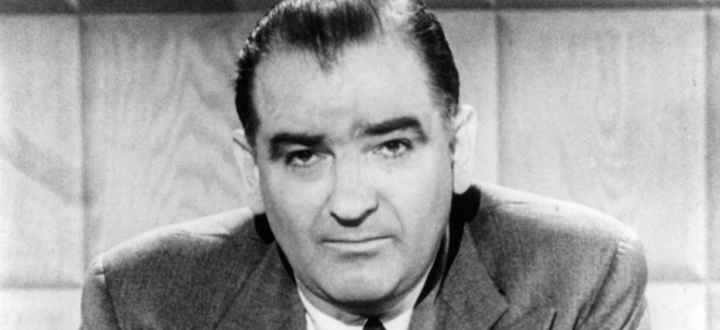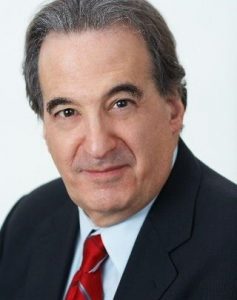Joseph McCarthy is the most unjustly demonized individual in American history.
In February 1950, McCarthy, a Republican senator from Wisconsin, launched a massive campaign against alleged Communists and Soviet agents working for, and perhaps spying on, the U.S. government. In Senate hearings stretching across much of the first half of the 1950s, he accused numerous U.S. government employees, including many in the State Department, of being Communists or even agents of Soviet Intelligence. He was bitterly opposed by powerful members of the Senate, by numerous high-ranking officials within both the Truman and Eisenhower administrations, and by the overwhelming preponderance of the press corps. He was finally censured by the U.S. Senate in December 1954 and died, possibly of effects of alcoholism, several years later. He was forty-eight.
The demonizations, then and now, involve charges that McCarthy lied, badgered, intimidated, victimized innocents, and fanned the flames of a massive anti-Communist hysteria. A typical account of his methods is provided by History.com’s “This Day in History,” which claims, “In widely publicized hearings, McCarthy bullied defendants under cross-examination with unlawful and damaging accusations, destroying the reputations of hundreds of innocent officials and citizens.”1
The pejorative term “McCarthyism” was coined by his critics to denote “The practice of making accusations of disloyalty, especially of pro-Communist activity, in many instances unsupported by proof or based on slight, doubtful, or irrelevant evidence.”2
Even historians who investigate and expose Soviet espionage penetration of the U.S. government claim that “McCarthy’s charges were, in fact, based on thin evidence” and that he “use[d] anticommunism for partisan purposes.”3
Finally, some FBI agents who actively pursued Soviet spies join in the chorus of criticism: “I . . . was more interested in countering the activities of the Soviet KGB and GRU. . . . McCarthy’s star chamber proceedings, his lies and overstatements hurt our counterintelligence efforts.”4
But evidence accumulated from a variety of sources—including Soviet archives—since the end of the Cold War in the early 1990s shows that McCarthy’s charges were, in numerous cases, neither false nor hysterical—but correct.
It is time to examine the new evidence objectively and to reassess McCarthy, his activities, and Soviet espionage penetration of the U.S. government. In so doing we perform an act of justice to a wrongly maligned man, gain greater knowledge of the Cold War’s early days, and sound a warning regarding possible espionage within and against the U.S. government by current or future enemies.
To reassess McCarthy accurately requires knowledge of (1) the murderously evil nature of Communism, (2) the massive Soviet espionage penetration of the U.S. government, and (3) the specifics of numerous cases regarding McCarthy’s efforts to expose that espionage.
Regarding the first of these, readers are encouraged to read my recent essay, “The Socialist Holocaust and its American Deniers,”5 and its sources, especially The Black Book of Communism, which provides data taken, in part, from the files of numerous former Communist regimes, including the Soviets. Suffice it to say here that, worldwide, Communism has been responsible for the murder of one hundred million innocent civilians.6 More, it has done so in strict adherence to its cardinal principle: Because members of the owning class cruelly exploit members of the working class, the former must be expunged in ruthless class warfare.
Items two and three—Soviet espionage penetration of the U.S. government and details regarding McCarthy’s efforts to expose it—are the focus of this essay.
Soviet Espionage Penetration of the U.S. Government
The Soviets targeted the Communists’ main ideological enemy, the capitalist United States, even during World War II, when the two nations were supposedly allied in a death struggle against fascism. Soviet agents achieved widespread penetration of the American government, spying, stealing secrets, ultimately supplying data enabling Stalin’s blood-drenched regime to develop an atomic weapon years earlier than otherwise.
The story reads like a spy thriller. . . .
You might also like
Endnotes
1. “This Day in History: December 2, 1954, www.history.com/this-day-in-history/mccarthy-condemned-by-senate. Retrieved September 14, 2016.
2. Dictionary.com. Retrieved September 13, 2016.
3. John Earl Haynes and Harvey Klehr, Early Cold War Spies: The Espionage Trials That Shaped American Politics (New York: Cambridge University Press, 2006), 40, 1.
4. Robert Lamphere and Tom Schachtman, The FBI-KGB War: A Special Agent’s Story (London: W. H. Allen, 1987), 137.
5. Andrew Bernstein, “The Socialist Holocaust and Its American Deniers,” The Objective Standard 11, no. 3 (Fall 2016): 84–94.
6. Stephane Courtois et al., The Black Book of Communism: Crimes, Terror, Repression (Cambridge, MA: Harvard University Press, 1999), 4.
7. Allen Weinstein, Perjury: The Hiss-Chambers Case (New York: Random House, 1997), 272–79; Whittaker Chambers, Witness (Chicago: Regnery Gateway, 1952), 34–42; Allen Weinstein and Alexander Vassiliev, The Haunted Wood: Soviet Espionage in America—The Stalin Era (New York: Modern Library, 1999), 44–45 and 46–47. Much of the information in The Haunted Wood is based on research into KGB files, briefly opened in the 1990s. Soviet code names, generally not discovered until years after the early Cold War period, are provided in The Haunted Wood, xi–xviii.
8. Weinstein, Perjury, 277, 279, and 283.
9. Chambers, Witness, 40–41; Weinstein and Vassiliev, The Haunted Wood, 44–45.
10. Weinstein and Vassiliev, The Haunted Wood, 47–48.
11. Weinstein, Perjury, 292–93; John Earl Haynes and Harvey Klehr, Venona: Decoding Soviet Espionage in America (New Haven, CT: Yale University Press, 2000), 90–91. Levine also made a list of those named by Chambers. White’s name appears on his list; it does not show up on Berle’s. Chambers, in his book, lists White as a Soviet agent but believed it possible he had not mentioned him to Berle.
12. Isaac Don Levine, Eyewitness to History: Memoirs and Reflections of a Foreign Correspondent for Half a Century (New York: Hawthorn Books, 1973), 197–98. Discussed at www.conservapedia.com/Alger_Hiss. Retrieved November 4, 2016.
13. Weinstein, Perjury, 293.
14. Haynes and Klehr, Early Cold War Spies, 66–67.
15. Haynes and Klehr, Early Cold War Spies, 67–68.
16. M. Stanton Evans, Blacklisted by History: The Untold Story of Senator Joe McCarthy and His Fight against America’s Enemies (New York: Crown Forum, 2007), 316–19.
17. Weinstein and Vassiliev, The Haunted Wood, 185–90; Lamphere, The FBI-KGB War, 132–60.
18. Weinstein and Vassiliev, The Haunted Wood, 195–97.
19. Weinstein and Vassiliev, The Haunted Wood, 197–202; Lamphere, The FBI-KGB War, 178–207.
20. Haynes and Klehr, Early Cold War Spies, 68.
21. Weinstein and Vassiliev, The Haunted Wood, 225–26.
22. Haynes and Klehr, Early Cold War Spies, 52–56.
23. Haynes and Klehr, Early Cold War Spies, 48–57.
24. Kathryn Olmsted, Red Spy Queen: A Biography of Elizabeth Bentley (Chapel Hill: University of North Carolina Press, 2002), 100.
25. Weinstein and Vassiliev, The Haunted Wood, 94–96.
26. Lamphere, The FBI-KGB War, 38–39; Haynes and Klehr, Early Cold War Spies, 65.
27. Olmsted, Red Spy Queen, 100–101.
28. Haynes and Klehr, Early Cold War Spies, 119–29.
29. Haynes and Klehr, Early Cold War Spies, 92–130.
30. Haynes and Klehr, Venona, 170–73. In the controversy still surrounding Hiss’s guilt, one undeniable point must be emphasized: “Ales” was a Soviet code name for a State Department official who was a GRU agent. This is usually taken to refer to Hiss. In the unlikely event that Hiss is indeed innocent, then, in justice, his name must be cleared. But then “Ales” refers to some other ranking State Department official spying for the Soviets.
31. Haynes and Klehr, Early Cold War Spies, 143–46 and 166–76. The definitive case for the guilt of the Rosenbergs is Ronald Radosh and Joyce Milton, The Rosenberg File, 2nd ed. (New Haven, CT: Yale University Press, 1997), passim.
32. Alexander Feklisov and Sergei Kostin, The Man behind the Rosenbergs (New York: Enigma Books, 2004), passim.
33. Haynes and Klehr, Venona, 128.
34. Evans, Blacklisted by History, 201–4. Given the mythology that McCarthy, in public, recklessly “named names,” thereby smearing the reputations of innocent persons, the truth is shocking: It was McCarthy’s enemies in the Senate who repeatedly called upon him to publicly name names, a procedure McCarthy was extremely reluctant to do. He desired hearings in executive sessions, privately, with thorough investigations into the activities of the suspects to determine whether, in fact, they were Communists and/or Soviet spies. He did not want to go public with names until and unless the guilt of such suspects was established.
35. John Earl Haynes, Harvey Klehr, and Kyrill Anderson, The Soviet World of American Communism (New Haven, CT: Yale University Press, 1998), 4–12 and passim.
36. Haynes, Klehr, and Anderson, The Soviet World of American Communism, 87.
37. Haynes and Klehr, Early Cold War Spies, 11; John Earl Haynes, Harvey Klehr and Fridrikh Firsov, The Secret World of American Communism (New Haven, CT: Yale University Press, 1995), 4–15, 96–118, 205–26, and passim.
38. Haynes and Klehr, Venona, 7.
39. Evans, Blacklisted by History, 326–29.
40. Evans, Blacklisted by History, 327; Haynes and Klehr, Early Cold War Spies, 81.
41. Haynes and Klehr, Venona, 444; Weinstein and Vassiliev, The Haunted Wood, 78, 158.
42. Bentley, whose veracity was widely criticized at the time, was fully vindicated decades later both by information unearthed in Soviet archives and, especially, by declassification of the Venona decrypts. “Venona and these other archival evidence showed that Elizabeth Bentley had told the truth and those she identified as Soviet sources were just what she said they were: spies who had assisted Soviet espionage against the United States.” Haynes and Klehr, Early Cold War Spies, 82–89; quote on 89; Haynes and Klehr, Venona, 163.
43. Haynes and Klehr, Early Cold War Spies, 73–74.
44. Haynes and Klehr, Early Cold War Spies, 73–79.
45. Haynes and Klehr, Early Cold War Spies, 79.
46. Evans, Blacklisted by History, 329–30; Haynes and Klehr, Early Cold War Spies, 73–79.
47. Evans, Blacklisted by History, 528–41.
48. Haynes and Klehr, Venona, 9–10, 138–40.
49. Evans, Blacklisted by History, 42–43; Haynes and Klehr, Venona, 90, 117, 128, and 143–44.
50. Haynes and Klehr, Venona, 143–44.
51. Haynes and Klehr, Venona, 143.
52. Evans, Blacklisted by History, 505–6.
53. Evans, Blacklisted by History, 510–11.
54. Evans, Blacklisted by History, 510. Related, KGB spymaster Feklisov (Kalistrat) spoke of an “unknown radar source” in the United States who supplied thousands of pages of secret data to the Soviets; Evans, Blacklisted by History, 510.
55. Evans, Blacklisted by History, 506.
56. Blacklisted by History, 510.
57. Evans, Blacklisted by History, 506.
58. For years, Sobell publicly proclaimed his innocence. Finally, in 2008, at age ninety-one, he admitted to the New York Times that, during World War II, he had transmitted U.S. military secrets to the Soviets (Sam Roberts, “Figure in Rosenberg Case Admits to Soviet Spying,” New York Times, September 11, 2008). Earlier, Soviet spymaster Alexander Feklisov had acknowledged Sobell as a Soviet agent (Feklisov, The Man Behind the Rosenbergs, 132). Discussed at en.wikipedia.org/wiki/Morton_Sobell. Retrieved October 18, 2016.
59. Evans, Blacklisted by History, 507.
60. Evans, Blacklisted by History, 509.
61. Evans, Blacklisted by History, 506–9.
62. Evans, Blacklisted by History, 512.
63. One such instance was his blanket denunciation of General George Marshall, especially ascribing to him pro-Soviet motives. Evans, Blacklisted by History, 411–24.
64. Norman Graebner, The New Isolationism: A Study in Politics and Foreign Policy since 1950 (New York: Ronald Press, 1956), 227. Quoted in en.wikipedia.org/wiki/Joseph_McCarthy. Retrieved September 22, 2016.
65. Quoted in en.wikipedia.org/wiki/Joseph_McCarthy. Retrieved September 22, 2016.
66. Ellen Schrecker, Many Are the Crimes: McCarthyism in America (Boston: Little, Brown, 1998), 46.
67. David Caute, The Great Fear: The Anti-Communist Purge under Truman and Eisenhower (New York: Touchstone Books, 1979), 21.
68. Joel Kovel, Red Hunting in the Promised Land: Anti-Communism and the Making of America (New York: Basic Books, 1994), 74, 95, and 233. Quoted in Haynes and Klehr, In Denial, 52.
69. Haynes and Klehr, In Denial, 52.
70. Evans, Blacklisted by History, 605.
















